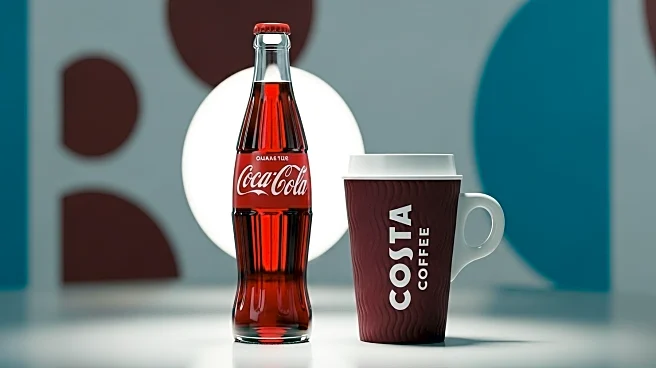What's Happening?
Coca-Cola is reportedly considering the sale of Costa Coffee, a UK-based coffee chain it acquired in 2018 for £3.9 billion. The decision comes as Coca-Cola reflects on its investment in Costa, which has not met the company's initial growth expectations. Costa Coffee's revenues have increased by 9% over the past year, reaching £1.22 billion, but remain below pre-acquisition levels. The coffee chain operates over 3,000 stores globally, with a significant presence in the UK. Coca-Cola's CEO, James Quincey, acknowledged that the investment in Costa has not delivered the anticipated growth in various verticals, such as ready-to-drink coffee and Express machines. The company is now exploring options, including a potential sale, to better align with its core beverage-focused business model.
Why It's Important?
The potential sale of Costa Coffee by Coca-Cola highlights the challenges faced by large corporations when diversifying into new sectors. Costa Coffee's integration into Coca-Cola's operations has been hindered by structural pressures in the retail sector, including rising costs and changing consumer habits. Selling Costa could allow Coca-Cola to refocus on its strengths in beverage distribution and brand equity, while Costa could benefit from an owner more aligned with retail and hospitality. This move could also impact the coffee retail market, as Costa is a major player in the UK and globally. The decision reflects broader industry trends where companies are reassessing their portfolios to optimize performance and shareholder value.
What's Next?
Coca-Cola has reportedly engaged Lazard, an investment bank, to review its options for Costa Coffee, with indicative orders expected in the autumn. Potential buyers include private equity firms and global operators experienced in scaling food and coffee retail. The sale could fetch around £2 billion, significantly less than the acquisition cost. Coca-Cola may retain an interest in Costa through ready-to-drink products, allowing it to capture coffee consumption occasions without the operational complexities of retail stores. The outcome of this strategic review will likely influence Coca-Cola's future investments and its approach to the coffee market.
Beyond the Headlines
The decision to potentially sell Costa Coffee underscores the importance of strategic alignment in corporate acquisitions. Coca-Cola's experience with Costa highlights the challenges of integrating a retail-focused business into a beverage-centric model. This situation raises questions about the long-term viability of such diversification strategies and the need for companies to adapt to changing market dynamics. The sale could also signal a shift in Coca-Cola's approach to the coffee sector, focusing on scalable formats that align with its distribution strengths.










